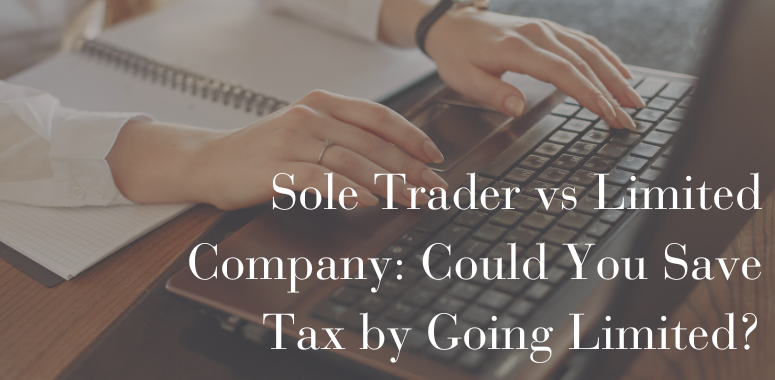Sole Trader vs Limited Company: Could You Pay Less Tax? | 2 Sisters Accounting

We’ve had quite a few conversations lately about whether becoming a limited company could save you money on tax. If you’ve been wondering about limited company tax savings, and asking yourself “Should I go Limited?” you’re not alone. The answer isn’t always a straightforward yes or no. Weighing up sole trader vs limited company requires thoughtful consideration.
In this blog, we’ll walk you through the key differences in how tax for sole traders varies from how limited companies are taxed. We’ll explain when going limited might save you money (and when it won’t), and show you how our tax comparison calculator can help you run the numbers for yourself. Whether you’re looking at what’s right for you or just want to understand how the tax rules work, we’ve got you covered.
How Sole Traders Are Taxed in the UK
As a sole trader, you pay tax on every penny of profit your business makes. It doesn’t matter whether you actually withdraw that money or leave it sitting in your business account – HMRC still wants its share.
You’ll pay:
- Income Tax on your profits, based on your personal tax band
- Class 2 and Class 4 National Insurance
It’s simple and straightforward, which is why many small businesses start this way. But when your profits start to grow, it can also mean a higher overall tax bill.
Income Tax Bands for Sole Traders
As a sole trader, your profit is treated as personal income and taxed according to standard Income Tax bands:
- The first £12,570 is tax-free (your Personal Allowance)
- The next £37,700 is taxed at 20% (basic rate)
- Profits above £50,270 are taxed at 40% (higher rate), and anything above £125,140 is taxed at 45% (additional rate)
These thresholds are applied after allowable business expenses are deducted, but they apply to total taxable income – so if you have other sources of income (like a part-time job or rental income), your business profits can push you into a higher tax band.
Class 2 and Class 4 National Insurance Explained
In addition to Income Tax, sole traders pay two types of National Insurance:
Class 2 NI:
- This is deemed as paid if your profits are above £6,725 so you don’t actually pay anything
- It contributes to your State Pension entitlement
Class 4 NI:
- Charged as a percentage of your profits:
- 9% on profits between £12,570 and £50,270
- 2% on profits over £50,270
Class 4 NI can be a significant cost as your business grows, especially since it kicks in at relatively low profit levels compared to Income Tax. You can find more about these thresholds on GOV.UK.
How Limited Companies Pay Tax
With a limited company, things work differently. The company is its own legal entity, so you don’t pay personal tax on everything it earns – only on what you take out of it. Let’s break down the parts.
Corporation Tax Overview
The company pays Corporation Tax on its profits, which currently ranges from 19% to 25% depending on your level of profit. The main rate of 25% applies if your company earns more than £250,000 in profit. For companies earning £50,000 or less, the rate is 19%. Between those two thresholds, a marginal relief calculation is applied to taper the rate. Corporation Tax is paid annually based on your company’s accounting period and is due 9 months and 1 day after the end of that period. Learn more about Corporation Tax here.
Salary and Dividends – What’s Taxed and When
As the owner of a limited company, you can choose to pay yourself through a combination of salary and dividends.
- Salary: Paid through PAYE, it is treated like regular employment income and is subject to Income Tax and National Insurance. This salary is also a deductible expense for the company, which reduces your Corporation Tax bill.
- Dividends: Paid from post-tax profits, dividends are taxed at different rates depending on your total income. For the 2024/25 tax year, the rates are:
- 8.75% (basic rate)
- 33.75% (higher rate)
- 39.35% (additional rate)
You’ll also have a £500 tax-free dividend allowance. It’s important to note that dividends can only be paid if the company has sufficient retained profit after Corporation Tax.
Using a mix of salary and dividends is often more tax-efficient than taking a full salary, but it depends on your profit level, personal income, and long-term goals.
That means if you don’t need to take out all the profit immediately, you could save on personal tax by leaving some money in the company. This is where the tax efficiency of limited companies comes in. Learn more about Corporation Tax here.
When Does Going Limited Save You Tax?
Let’s say your business makes £50,000 profit.
- As a sole trader, you’ll pay tax on all £50,000
- As a limited company, you could choose to pay yourself a mix of salary and dividends – and possibly leave some profit in the business for future use
The Employer’s Allowance Advantage
If you have another employee on payroll, you could also benefit from the Employer’s Allowance, which saves you up to £5,000 in employer National Insurance. Details are available on the GOV.UK Employer’s Allowance page.
Profit Retention and Tax Efficiency
Of course, this approach only works if:
- You don’t need to withdraw all of the profit straight away
- Your business is actually generating profit in the first place (dividends can’t be paid without it)
Beyond the Tax Bill – Other Reasons to Go Limited
We’ll be honest – these days, the decision to go limited isn’t purely about tax savings. You also need to think about:
- The admin and accountancy costs involved in running a limited company – Unlike sole traders, limited companies must file full statutory accounts, submit Corporation Tax returns, and run a formal payroll. This usually means higher accountancy fees and more time spent on compliance.
- How you want to position your business in the market – Some clients and suppliers see limited companies as more established or credible, which could be an advantage depending on your industry. A limited structure can also help you separate personal and business branding.
- Whether limited liability is important for you personally – As a limited company, your personal assets are protected if something goes wrong with the business (as long as you follow legal and financial responsibilities). For sole traders, there’s no legal distinction between personal and business finances, which could put your personal wealth at risk.
Tax is one part of the picture – but it’s a good place to start if you’re comparing options.
Compare Your Tax Bill – Try Our Calculator
Not sure how it would work out for your business?
We’ve created a calculator you can purchase for £7.50 that compares your tax bills as a sole trader versus a limited company. Just pop in your profit level, adjust the dividends and salary if needed, and it’ll show you how your tax bill changes depending on the structure you choose.
It’s perfect for:
- Seeing the impact of paying yourself more or less
- Factoring in an additional employee (and the Employer’s Allowance)
- Planning ahead for a possible switch to limited company status
Click here to try the tax comparison calculator
Still Not Sure? Let’s Chat
If you’re on the fence, or thinking about making the switch this year, we’re here to help you weigh up your options. Every business is different – and we’ll help you make the right decision based on your profit levels, goals, and how you want to run things.
Get in touch with us at 2 Sisters Accounting today and let’s chat about what’s best for you.

